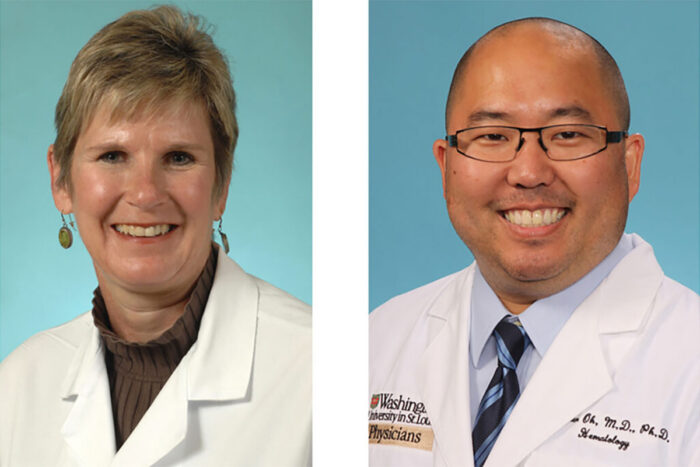Majerus, Oh tapped to co-lead hematology division
Experts in clinical operations and basic science to lead division
 Washington University School of Medicine
Washington University School of MedicineElaine M. Majerus, MD, PhD, (left) and Stephen T. Oh, MD, PhD, have been selected to co-lead the Division of Hematology at Washington University School of Medicine in St. Louis.
Elaine M. Majerus, MD, PhD, and Stephen T. Oh, MD, PhD, have been selected to co-lead the Division of Hematology in the Department of Medicine at Washington University School of Medicine in St. Louis.
Majerus, a professor of medicine, will direct the clinical operations, clinical research and clinical training aspects of the division’s work. Oh, an associate professor of medicine and of pathology & immunology, will be responsible for the basic and translational research aspects of the division. They officially began in their new roles Dec. 1.
“I am delighted that Dr. Majerus and Dr. Oh will be taking on these vital leadership roles in our hematology division,” said Victoria J. Fraser, MD, the Adolphus Busch Professor and head of the Department of Medicine. “Dr. Majerus is an outstanding clinician who provides compassionate, cutting-edge care for patients with benign blood disorders. In addition to being an exceptional clinician and educator, Dr. Majerus runs a successful clinical trials program focused on patients with bleeding disorders. And Dr. Oh exemplifies the physician-scientist, leading a strong basic research program, a robust clinical trial research program, and an active clinical practice caring for patients with disorders of the bone marrow.”
Majerus, who treats patients at Siteman Cancer Center at Barnes-Jewish Hospital and Washington University School of Medicine, has led many clinical trials investigating new therapies for sickle cell disease and hemophilia. She has been a national leader in enrolling patients in clinical trials for phase 1 and phase 2 studies of the drug regadenoson (Lexiscan) in sickle cell disease and was the site principal investigator for local studies of adenovirus-associated virus vector mediated gene transfer of human factor VIII in hemophilia. She also established a number of registries and biobanks for a variety of blood clotting disorders, including thrombotic microangiopathies.
Majerus also established the federally funded Center for the Treatment of Bleeding and Blood Clotting Disorders at Washington University. The center provides comprehensive, multi-disciplinary care for children and adults with bleeding disorders, including hemophilia and von Willebrand disease. The center also operates a pharmacy under a federal program to provide more affordable access to lifesaving blood replacement products for patients with hemophilia and now provides therapies for thrombotic diseases and idiopathic thrombocytopenic purpura.
Majerus had served as interim director of the division since 2018, stepping into the role after the death of J. Evan Sadler, MD, PhD, who had led the division since 2009. Under her leadership as interim director, Majerus expanded the division’s clinical operation and established clinics in Columbia, Mo., and Carbondale, Ill. The division also opened an outpatient pulmonary embolism clinic in conjunction with the Division of Pulmonary & Critical Care Medicine, added new telemedicine clinics, and expanded sickle cell services in north St. Louis County, at Christian Hospital. Under Majerus’ leadership, the hematology division has seen an 18% increase in ambulatory visits and a 7.4% increase in new patients.
Majerus earned a bachelor’s degree in biology and a doctoral degree in molecular cell biology and biochemistry from Washington University, and her medical degree from Saint Louis University. She completed her residency training in internal medicine at Barnes-Jewish Hospital and a hematology-oncology fellowship as part of Washington University’s physician-scientist training program.
Oh, who treats patients at Siteman Cancer Center at Barnes-Jewish Hospital and Washington University School of Medicine, was recruited to the Division of Hematology at Washington University, where he has developed an independent research program investigating the initiation, development and progression of myeloproliferative neoplasms, types of blood cancers that cause the bone marrow to produce too many white blood cells, red blood cells and platelets.
A major focus of Oh’s laboratory research is to investigate how cellular signaling networks become dysregulated in myeloproliferative neoplasms. His group has reported the novel identification of overactive signaling of a pathway called NFkB in myelofibrosis. His group further identified the intracellular signaling pathways driving inflammatory cytokine overproduction in myelofibrosis, and demonstrated that a common treatment approach inhibiting JAK2 does not fully fix abnormal inflammatory cytokine production in myelofibrosis. He has successfully translated his laboratory findings to the clinic via an investigator-initiated study targeting NFkB with pevonedistat in patients with myelofibrosis.
Oh earned a bachelor’s degree in biochemical sciences from Harvard University, and completed his medical and doctoral degrees at Northwestern University. Oh later went to Stanford University for residency, fellowship and postdoctoral training before joining the Washington University School of Medicine faculty in 2010. His laboratory research is supported by multiple National Institutes of Health (NIH) grants.
Known as a committed mentor, Oh also serves as program director of the molecular hematology T32 training program, which is nearing 50 years of continuous support by the National Heart, Lung, and Blood Institute of the NIH. Since 2014, he also has co-led the immunomonitoring laboratory in the Bursky Center for Human Immunology & Immunotherapy Programs.
Oh has received numerous awards in support of his work, including the Doris Duke-Damon Runyon Clinical Investigator Award, the Sidney Kimmel Foundation Scholar Award, the American Society of Hematology Scholar Award, and the Leukemia & Lymphoma Society Translational Research Program.






